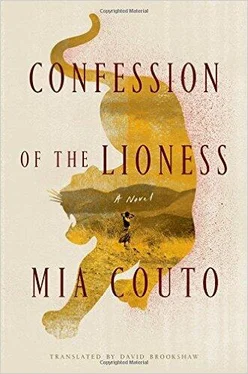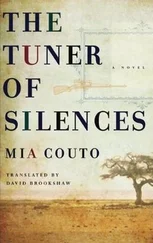This is my son, this is your grandson , I shouted, my open hands dripping, red and viscous, as Hanifa Assulua entered my room.
* * *
Today, I know: The story of my childhood is no more than a half-truth. In order to deny a half-truth one needs far more than the whole truth. That huge truth, so vast that I couldn’t capture it, was only one truth: It wasn’t the physical punishments that made me sterile. That was the more palatable version invented by my mother. The crime was another one: For years, my father, Genito Mpepe, abused his daughters. First, it happened with Silência. My sister put up with it quietly, without sharing this terrible secret. The moment my breasts began to show, I was the victim. At the end of the day, Genito would migrate away from himself by means of lipa , the palm liquor. After he’d drunk his fill, he would come into our room and the nightmare would begin. The incredible thing was that, at the moment of rape, I exiled myself, incapable of being the person lying there under my father’s sweating body. Through some strange process, I managed to forget straight afterward what I had been through. This sudden amnesia had one purpose to it: to avoid my becoming an orphan. In the end, everything that occurred never got as far as actually happening: Genito Mpepe escaped to another existence and I turned into another creature who was inaccessible and nonexistent.
My mother, Hanifa Assulua, always pretended she didn’t know anything. It was the neighbors’ invention, the frenzy of those wishing to hide their own ills. When the evidence overwhelmed her, she summoned me and asked, her voice trembling:
Is it true?
I didn’t answer, my gaze fixed on the ground. My silence, as far as she was concerned, was confirmation:
A curse on you, you hussy!
Without reacting at all, I saw her jump on me, attacking me with her fists and feet, insulting me in her mother tongue. What she said, amid all her spitting and foaming, was that it was my fault. It was all my fault. Even though Silência had warned her: It was I who provoked her man. She didn’t refer to Genito as my father. He was now “her man.”
Get out of this house. I never want to see you here again.
* * *
I never got as far as leaving. On the contrary, I shut myself away between the walls, so much so that no one had ever become so cloistered inside a house. Hanifa Assulua summoned a witch doctor and this uwavi made me drink a bitter potion. For a whole day I took it from a little clay pot. The following day, the poison had worked. I had turned into a body without a soul. Instead of blood, I had a venomous sap: That’s what remained in my veins.
My mother was getting her revenge: Before, she had transferred my illness to the tree in our yard. Now she was carrying out takatuka in reverse: She was displacing my life to the dead tree. And in an instant it was reborn, proud and verdant. I, on the other hand, turned into an inanimate creature. I only had one faculty left: I had the power of hearing. For the rest, I was surrounded by some ancient, congenital darkness.
What Hanifa Assulua intended was more than my physical elimination. Dying was the least of it. My very birth had to be erased. The dead aren’t absent: They remain alive, they speak to us in our dreams, they weigh upon our conscience. The punishment reserved for me was complete and utter exile. Not from Kulumani, but exile from my reason and from language. I was declared mad. Madness is the only perfect absence. In my insanity I was visible, but shut away; sick but without any wound; hurt but without any pain.
My grandfather Adjiru attempted to save me, and tried out his own mintela . But it was in vain. Father Amoroso was called. But this time the Portuguese priest was unable to bring about a miracle. Take her to the hospital straightaway was all he had to say. They took me to Palma and the nurse produced a diagnosis without even batting an eyelid: These things have no cause.
With some luck, she’ll walk again.
I stayed in the infirmary for some time without showing any sign of improvement. Medicine gave up on me, but that wasn’t why they left me there. I remained in the hospital at Palma, lifeless, and with even less company. It was only later that I understood why my return to Kulumani had been delayed. My grandfather Adjiru died during that time. They didn’t want me to be present. Not to save me from having to say farewell. But in order that my farewell should last a lifetime.
* * *
On the first anniversary of my grandfather’s death, they took me to visit his grave. The deceased had left an express wish that he wanted me to be present at the ceremony. I had already returned home, but my condition hadn’t altered. No one wanted to carry me along the road in such a state. I might contaminate the vehicles. They chose to take me down the river in a boat, as far as the sacred wood that was the resting place of Adjiru and my great-grandfather Muarimi.
With the strength of their arms they deposited me in the craft. At that moment, my body rolled over and I fell, helpless, into the waters of the River Lideia. They say I disappeared down to the deep riverbed and remained immersed for a long time. When they eventually pulled me out, I wore the mesmerized expression of the newly born. Gradually I appeared before the eyes of the world. I took a few staggered steps around me, shook my shoulders as if freeing myself from an invisible burden. There was no doubt, according to the family’s chorused testimony:
Mariamar has returned! Mariamar has returned!
I was the focus of their astonished looks. I was the center of the universe. Silence fell, my family waiting for what would come next.
Where are my sisters? These were my first words.
They brought forward Silência, my eldest sister, and the little twins, Uminha and Igualita. In silence, I kissed Silência and knelt down to look at my youngest sisters. In my own mind, only a few months had passed. But the girls were sadly old. I always wondered whether there were ever any children in Kulumani. Can one call a child a creature who cultivates the soil, chops firewood, carries water, and at the end of the day doesn’t have anyone to play with?
Suddenly my father broke the silence, put an end to our hugs, and declared:
We’re going to see the ocean.
The ocean? my mother answered, astonished.
The whole family’s going, Genito Mpepe exclaimed peremptorily. That’s what I promised your grandfather.
It wasn’t to the ocean that I wanted them to take me. All I wanted was to return to my mother’s arms, for her to lull me, and for me to be a little girl again. That was the only ocean I wanted. That’s when I understood why Father Amoroso spoke so often of the final deluge. That’s what I yearned for: a flood that might wipe away this world. This world that forced a woman like Hanifa to have children, but that didn’t allow her to be a mother; that forced her to have a husband, but didn’t allow her to know love.
* * *
The whole family was enraptured by the sight of the ocean in all its vastness, its living infinity, its unlimited horizon that seemed to originate in our very selves. My sisters, benumbed with astonishment, were lost for words, infatuated by such immensity. I was the only one to walk down to the shoreline. What fascinated me wasn’t this absence of limits. I was enchanted by the foam, the shreds of spume that were released from the crest of the waves. Like white birds, without weight or wings, these scraps would launch into fanciful flight only to dissolve in the air. I rolled the word “spume” on my lips and uttered it a thousand times. If one day I were to have a daughter, I would call her Spume.
Читать дальше












